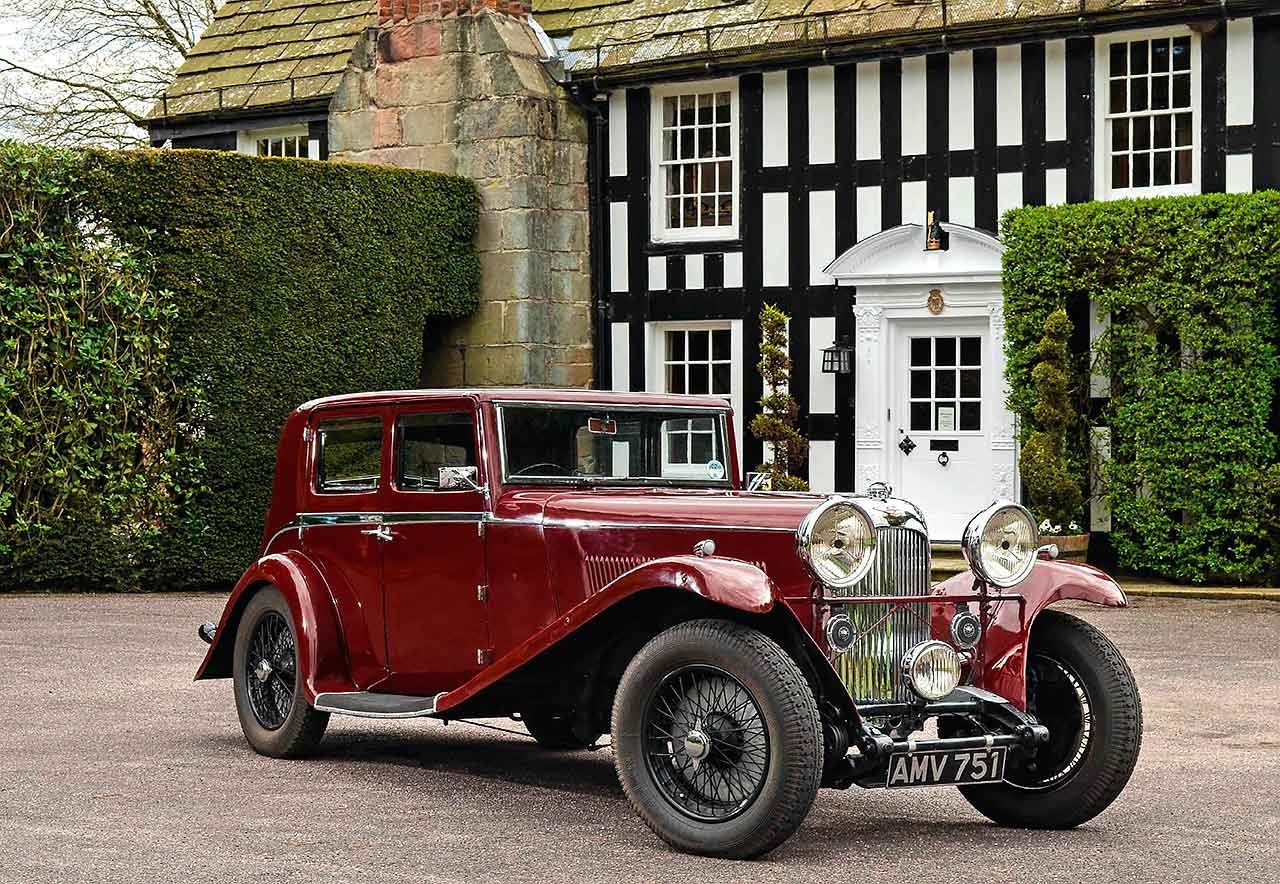
Five decades together: David Hine and his much-loved Lagonda M45. A Lagonda affair. Winter wheels that became a fixture… Lifelong Lagonda. When 22-year-old David Hine bought this glorious M45, says Malcolm Thorne, little did he suspect that he would own it for more than five decades. Photography Malcolm Thorne.
You could say that this car owes its existence to my old metallurgy lecturer,” says David Hine as he proudly poses for a photograph alongside his beautifully timeworn Lagonda M45. “I was a student at UMIST in 1961 and I really wanted an MG TD, but my father refused to let me have one, saying that sports cars were too dangerous. I wasn’t best pleased, but one day I saw Doc Evans roar into the college car park – in a shower of cinders – in his Lagonda M45R. That was it: I just knew that I had to have one.”
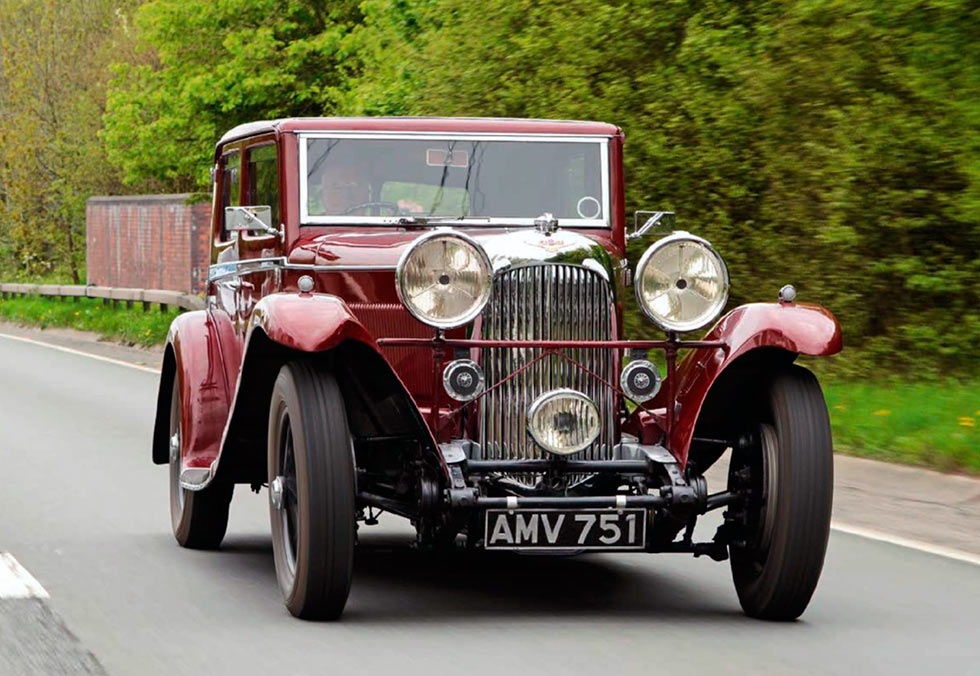
Hine Snr promptly agreed to his son acquiring such a vehicle – “It certainly didn’t have the image of a young man’s car, so it probably seemed like a safer, more sensible choice to him” – and, in 1962, he purchased a 1934 M45 T8 open fourseater tourer. “BLP 494 cost £400,” remembers Hine today, “which would have been quite a bit cheaper than the MG that I’d originally wanted. It was a lovely car, and became quite well-known in Lagonda Club circles as a result of me taking part in driving tests, rallies and concours events. I also made lifelong friends in the process.”
By 1965, with his student days behind him, Hine was working as a shift technologist at Petrochemicals, which, as he wryly points out, meant getting up late at night and early in the morning: “For all its appeal, BLP 494 was an awfully cold thing in which to drive across Carrington Moss in winter.” With the young enthusiast keen to remain warm while still enjoying Lagonda motoring, he began thinking about a closed car.
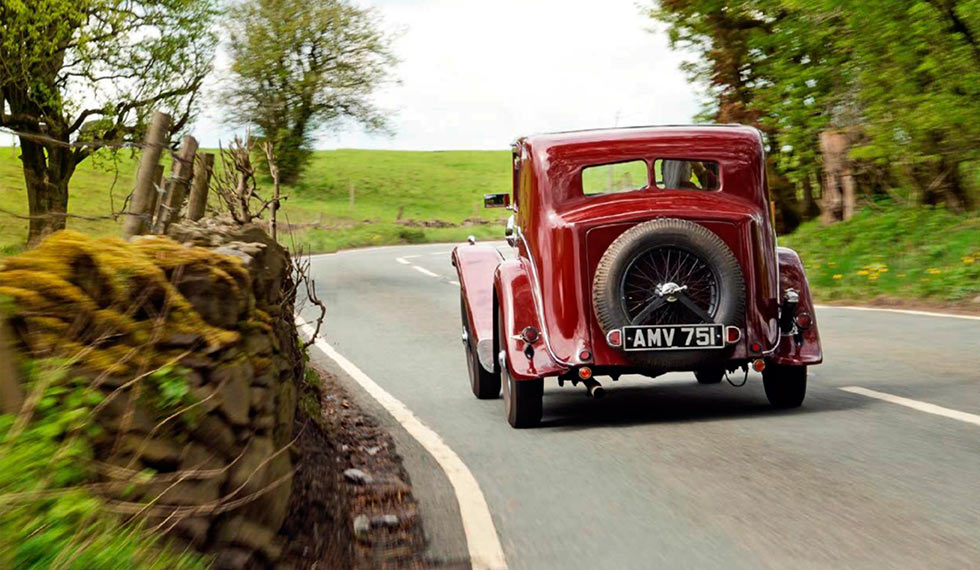
It was at this point that AMV 751 entered the story: “I saw an advert in the classifieds of the Manchester Guardian offering a 1934 M45 saloon for £100. My girlfriend Jill and I – we’ve just had our 50th wedding anniversary! – went to look at it at Drakelow Hall, Byley, and I offered the seller Ian Stout £90, which he readily accepted.
On reflection, given how keen he was to take £90, I should probably have offered him less.” Today’s classic owners will be familiar with the idea of the winter hack, a car in which to brave the worst of our damp climate while more cherished vehicles remain tucked up in a garage – and that’s precisely the circumstance in which this imposing saloon came into Hine’s life: “It had a roof and I fitted a heater, which was brilliant. You would get a bit high on the combination of exhaust fumes and smoke from my pipe, though, because it did burn a fair bit of oil when I first got the car. It really did feel luxurious, however, and of course it allowed me to lay up BLP each winter to undertake any repair work that was needed. That first year, for example, I sent the open car to have the bodywork renovated and repainted by Thompson-Doxy of Southport – for £200.”
‘LAST AUTUMN, HINE UNDERTOOK AN EPIC, 1000-MILE-PLUS JAUNT TO NORTHERN SPAIN’
For a couple of years, Hine continued to alternate between the two cars, the tourer serving him during the summer months and the saloon being pressed into duty as the nights drew in and temperatures dropped. “I would drive over to Sheffield in AMV to see Jill, often crossing the Snake Pass alone,” he recalls. “It’s actually a very good car in snow; I can highly recommend it.”
In July 1966, while the rest of the country developed World Cup fever, Hine set about trying to cure the smoky engine that had plagued the Lagonda since the day he bought it, Maurice Leo of Beaconsfield supplying a set of replacement piston rings for the princely sum of £10 11s 6d. Hine stripped down the 4467cc Meadows ‘six’ – even filing the big-end caps – and fitted the new parts himself: “That improved matters, although it didn’t entirely cure the problem.”
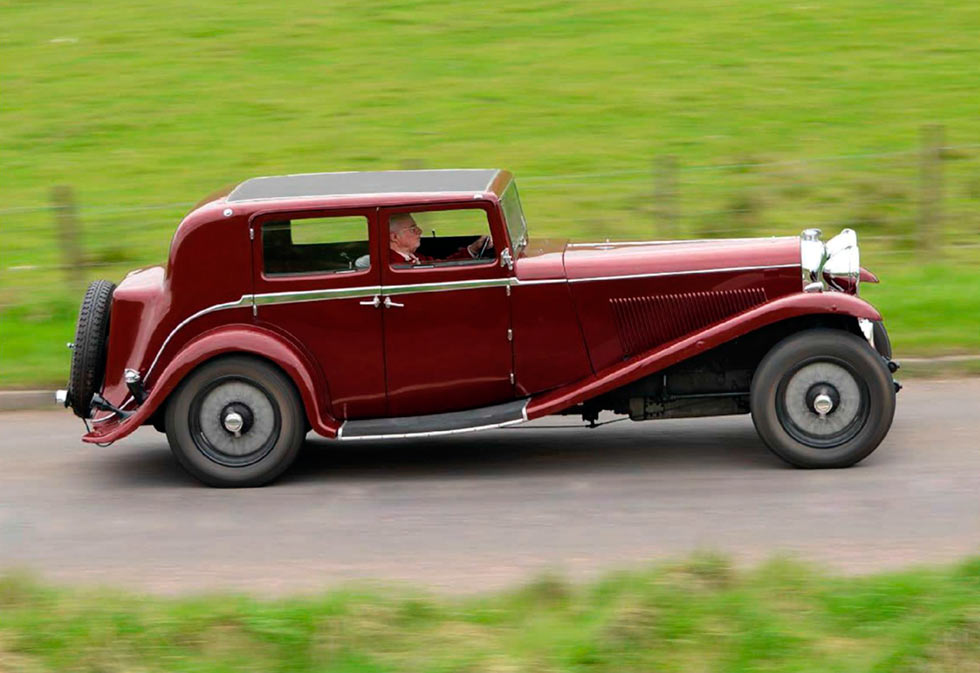
The following year could have been the end of our story, because in 1967 Hine decided to part with both Lagondas to fund the purchase of an LG45 Rapide. “That really was an impractical car,” he points out. “It was far too precious and exotic.” That might easily have been as far as his involvement with AMV 751 went, but, three years later, in 1970, he discovered that the M45 had been abandoned by its then owner, Alan Booth, after suffering mechanical ailments.
“He had not been able to get the clutch to engage properly,” says Hine, “so had parked it up next to an old barn near Bolton and left it there to rot. I got wind of it and decided that I couldn’t possibly let that happen to the old girl, so I went to see the car. It had gone down in value a bit, mind. I’d sold it for £400 and bought it back for £350, because it was in much worse condition.”
Fortuitously, the problem with the clutch was a simple question of adjustment and Hine, who, thanks to his previous involvement with M45s, was well versed in their foibles, had the Lagonda working within 10 minutes. The coachwork was a different matter, though. The ash-framed, aluminium-skinned ‘Silent Travel’ body had suffered quite badly since he sold it during the summer of love, and the car was in a poor state. “It’s lucky that she didn’t end up being rebuilt into a special,” he muses, “because there was little financial incentive to repair a saloon. The ’screen pillars in particular were quite rotten – to such an extent that one of the doors actually fell off.”
“I WOULD OFTEN DRIVE OVER THE SNAKE PASS ALONE: IT’S ACTUALLY VERY GOOD IN SNOW”
Hine’s increasing devotion to the marque led him to tackle a major overhaul of the M45 during the 1970s, albeit entirely in the spirit of the era and embracing the latest technology: “By then I was working for Shell Chemicals, and it had developed a new type of two-pack polyester resin. I got hold of some and injected the stuff into the ash windscreen pillars, and it turned out to be just the job. I’ve not had to touch them since, and they are still nice and solid today.”
Pooling their resources, Hine and a small group of like-minded individuals had started renting (and later bought) an old slaughterhouse in Oldham. For five years the building served as a garage and weekend workshop for their vehicles: “The place was in quite a state. If you hit anything with a hammer, a great shower of white bone dust would drift down from the rafters and cover everything.” Rudimentary or not, though, the abattoir would serve as a convenient base while Hine further fettled the saloon.
“The outside of the M45 was grey all over when I bought it,” he recalls, “the panels, the chrome and even the edges of the glass in places. So I decided to have it repainted, and chose the maroon that it still wears today because it matched the interior. It’s actually a Volvo colour – they all seemed to be that shade back then.”
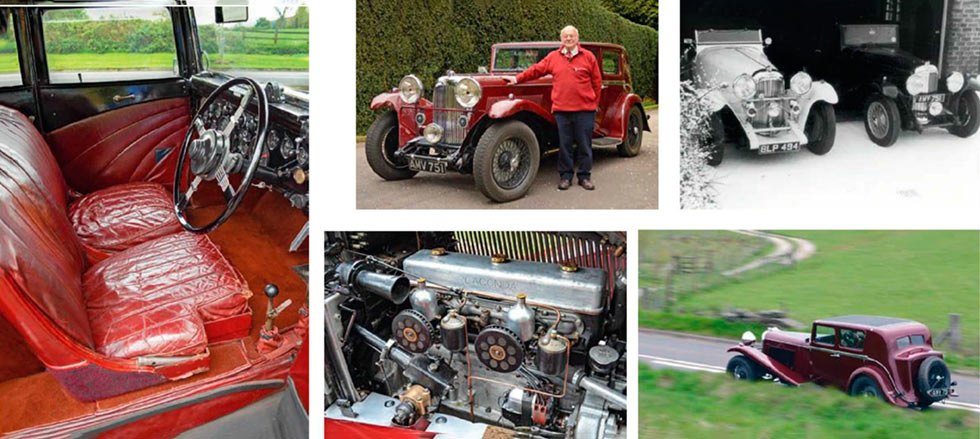
With the coachwork having regained its structural integrity as well as its former lustre, Hine set about having the brightwork replated: “I knew a chap who worked on the night shift at Platts Textiles and who could do that sort of thing. I would drop bits off to him one at a time, slip him a few bob, and would get the parts back the next time I saw him. It must have taken about a year to rechrome everything, but it’s holding up well, so it was worth the wait.”
Other improvements involved replacing the aged wiring, as well as a comprehensive engine rebuild – which this time finally cured the six-cylinder Meadows unit’s smoking habit. With the Lagonda back in one piece and looking rather more presentable, it was pressed back into service during the 1980s and ’90s, again being used mainly during the colder months, as it had done during Hine’s youth. The much-travelled car became a familiar sight at club events, and a trip to Monk Fryston in North Yorkshire brought back memories of its earlier life as Hine’s daily driver – sudden and unexpected snowfall en route back to Macclesfield echoed those wintry journeys across the Pennines in the 1960s.
Thus continued a life of regular use and careful maintenance – but no restoration – until, in 2001, the car suffered an infestation of woodworm. Fortunately, though, the invaders didn’t attack the ash frame. “The back of the car was full of dust and I couldn’t work out where it was coming from,” Hine explains. “Luckily, the penny finally dropped and once I investigated further it transpired that they had only attacked the plywood boot area, which I was able to replace without disturbing the rest of the body.”
Six years later came a second major engine overhaul, which this time involved a new block and crank as well as fresh double-helical gears in the ’box and a high-ratio back axle to replace the worn-out original. The M45 was never a slouch and, even with heavy saloon coachwork, could outperform most other cars in the mid-’30s. With the longer diff, though, it is a competent – albeit unlikely – motorway cruiser. “Even at 84 years old,” enthuses Hine, “it will happily sit at 65mph.” As such, Hine thinks nothing of undertaking considerable distances behind the wheel.
Many people might blanch at the near-400-mile round-trip from Macclesfield to St Athan in south Wales for the Aston Martin Owners Club Spring Concours, which is where we first met this remarkable owner. Hine topped that last autumn, though, with an epic, 1000-mile-plus jaunt to northern Spain.
An amazing feat for this octogenarian saloon and its septuagenarian keeper, both taking it in their stride. “It never missed a beat,” he proudly reports. The mountain roads of the Iberian peninsula did highlight the benefit of the one concession that Hine has made: “Four years ago, using a spare steering column, I installed a discreet EZ power-steering conversion so that I can continue to drive the car until I expire.”
Taking the wheel of this majestic old girl, it’s easy to understand how it became the object of such an enduring relationship. The torquey overhead-valve Meadows straight-six is a superb engine that makes a wonderfully robust noise, and hauls the large heavy saloon – Hine says that the Lagonda weighs all of 1800kg – up hill and down dale with admirable ease. The combination of a centre throttle pedal and crash ’box with a right-hand change means that the first few miles demand a fair bit of concentration if you’re not familiar with the peculiarities of pre-war motoring, although it is hugely appealing and, as you acclimatise, it is impossible not to fall for the M45’s considerable charms. It doesn’t hang about, either, and the original vacuum-operated servo-assisted drum brakes are remarkably effective, pulling up the big car square and true.
The small ‘Silent Travel’ plaque on the sill may seem ironic in a world where even 1-litre shopping trolleys are eerily refined, but this is a wonderfully captivating machine that stole my heart on a drive around rural Cheshire.
Above all, this 84-year-old Lagonda wears its well-earned patina with pride. The Volvo paint that was applied during the 1970s may be getting a little faded, the leather and carpets a touch worn around the edges, but it’s one of the most authentically unmolested motor cars that you could ever hope to encounter – a vehicle that has never been restored but instead carefully preserved and meticulously maintained. It is a credit to its hugely inspiring owner.
Moreover, it is deeply reassuring to encounter a saloon that escaped the chop and still wears its factory ST34 coachwork. That the tourer which introduced Hine to the joys of Lagonda ownership still survives is perhaps unsurprising – last year the two were reunited at the club’s AGM – but AMV 751 is a rare treat among pre-war thoroughbreds. The classic world owes a debt of thanks to the protective father who vetoed the purchase of an overly sporty MG.






